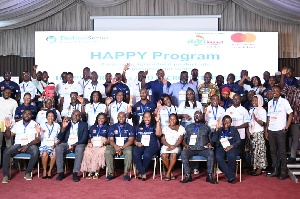- Home - News
- Elections 2024
- News Archive
- Crime & Punishment
- Politics
- Regional
- Editorial
- Health
- Ghanaians Abroad
- Tabloid
- Africa
- Religion
- Photo Archives
- Press Release
General News of Wednesday, 30 April 2025
Source: www.ghanawebbers.com
TechnoServe to support HAPPY program benefiting 168 entrepreneurs
TechnoServe has launched grant support for 168 microentrepreneurs and agri-SMEs in Ghana. This initiative focuses on the poultry, tomato, rice, and soybean value chains. It is part of the Harnessing Agricultural Productivity and Prosperity for Youth (HAPPY) Program.
The HAPPY Program is a collaboration with the Mastercard Foundation and Agri-Impact Limited. Eight partners are involved, including the Ghana National Service Authority and Catholic Relief Services. The program aims to boost agricultural productivity in these key sectors.
This four-year initiative targets sustainable job creation for 326,000 young people aged 15 to 35. It emphasizes opportunities for women and persons with disabilities.
At the kickoff event on April 28-29, 2025, Juliana Asante-Dartey spoke about the program's goals. She highlighted that Ghana still imports significant amounts of rice and poultry. The country produces less than 20% of its poultry demand.
Asante-Dartey stated that the HAPPY Program aims to improve productivity across all four value chains. By the end of four years, they hope to create dignified jobs for young people, especially women. They also aim to increase outputs by over 189,000 metric tonnes.
Mr. Daniel Ninson from the Mastercard Foundation emphasized youth as key to Africa's prosperity. He noted that programs like HAPPY invest in young entrepreneurs and women-owned businesses. The goal is to create sustainable jobs in agriculture.
Ninson acknowledged that agriculture is a major employer in Ghana but often seen as unattractive by youth. The HAPPY Program seeks to change this perception by unlocking opportunities across various agricultural sectors.
Frank Obiora Mgbemena from TechnoServe stressed supporting small and medium enterprises led by bold entrepreneurs. Over two years, TechnoServe will provide technical assistance, grants, market linkages, and financial resilience support.
Zainab Acheampong from Hakama expressed optimism about the project’s impact on her tomato processing business. She believes technical support and grants will help them grow sustainably.
Acheampong stated that this initiative represents a positive direction for their future as a business.











